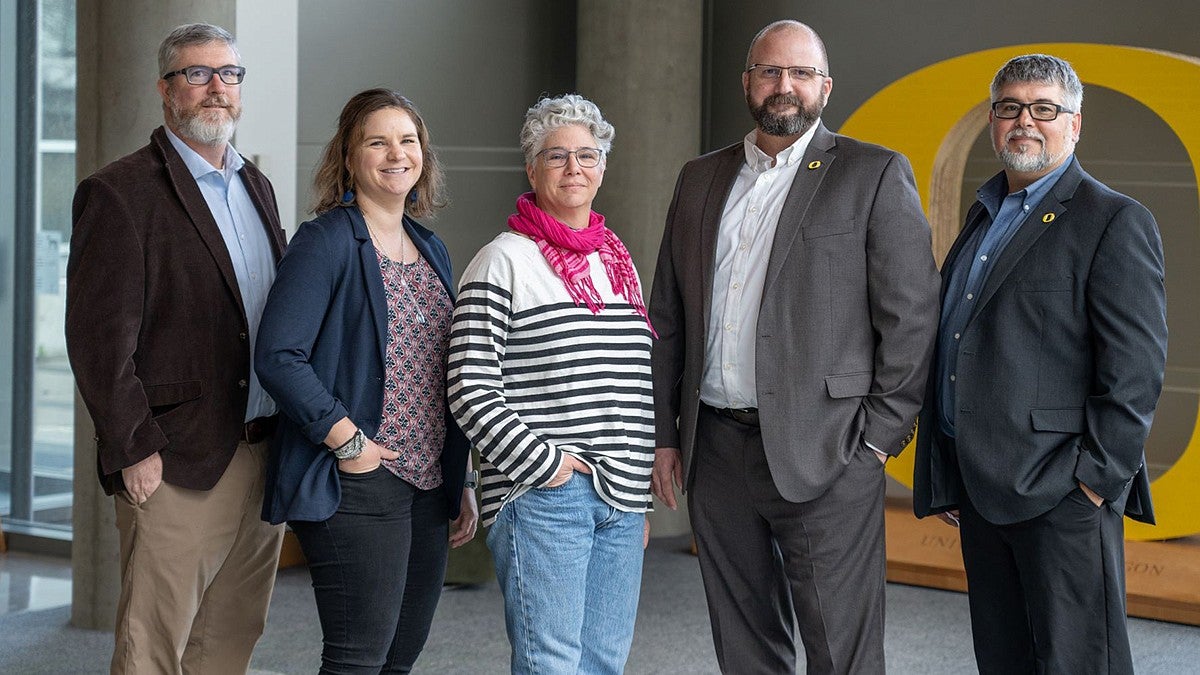Building on the work of the University of Oregon’s longstanding Institute for a Sustainable Environment, the UO has established a new institute to research how society can become more resilient in the face of the growing threats.
The Institute for Resilient Organizations, Communities, and Environments is a multidisciplinary effort, bringing together faculty and student researchers from across campus, to collaborate on applied research projects designed to address specific, real-world challenges. The institute will tackle problems stemming from natural disasters, human-caused hazards, climate extremes, pandemics and other risks.
The institute is led by UO Chief Resilience Officer André Le Duc, a nationally recognized expert in organizational and disaster resilience. The field of resilience research studies how organizations, communities or systems can best respond to a change — be it fast or slow, planned or unplanned — by adapting and recovering quickly, without losing core functions or services.
“The problems we face, whether it’s wildfires, poor air quality, climate change or earthquakes, all require true, applied research in this very moment,” Le Duc said. “Our goal is to develop tools, systems and strategies that can help communities, organizations and environments right now, while also ensuring we are future-ready.”
The new institute combines three existing programs at the university — the Ecosystem Workforce Program, the Location Innovation Lab, and the Disaster Resilient Universities Network — with the Oregon Campus Resilience Consortium and the new Center for Wildfire Smoke Research and Practice. The new wildfire smoke center has $800,000 in funding from the 2022 federal budget bill, secured thanks to the support of U.S. Sens. Jeff Merkley and Ron Wyden, both of Oregon.
Faculty members in the institute focus on a variety of issues tied to resiliency, including natural resource and forest management, network infrastructure, communication systems, emergency management, resource sharing, natural disasters, land use, climate change and rural development.
Le Duc has additional ideas for improving community resiliency through the new institute. One proposal is the Regional Resiliency Building, which is designed to protect critical communications and network infrastructure in the event of a major earthquake.
“IROCE operationalizes systems of resilience by purposefully thinking ahead about what could go wrong and preparing to meet potential challenges head-on,” said Anshuman “AR” Razdan, vice president for research and innovation at the UO.
Researchers in the institute’s programs provide different skill sets and expertise to work on crosscutting themes where solutions require an integrated approach, such as forest management, climate adaptation, and the disruption of systems that endanger community and ecosystem resilience. As they work to tackle real-world resiliency challenges, institute leaders said they are excited to advance relationships with campus and industry partners, including the UO Hazards Lab, UO Environment Initiative and New Zealand-based Resilient Organisations.
“We’re all coming at these same kinds of resilience issues from different directions,” said research professor Cassandra Moseley, who will lead the Center for Wildfire Smoke Research and Practice.
The wildfire smoke center will help communities, policymakers and local governments across Oregon be better prepared for smoke events and help them protect their most vulnerable populations.
“In my experience as an academic and practitioner, the most creative and effective problem-solving occurs when we bring people from different disciplines and practices together,” Moseley said.
Associate research professor Heidi Huber-Stearns, director of the Ecosystem Workforce Program, said she’s hopeful the resiliency institute will provide an infusion of new energy from other parts of campus into the program, which works at the intersections of ecology, economy and governance as an applied social science research and extension program.
“There’s an increasing public interest in understanding how we connect the work we do to some very current issues,” she said. “My hope is that (the new institute) will help amplify our work across the university.”
The Location Innovation Lab, a nationally recognized leader in designing location-based software systems and developing web and mobile applications for resilient organizations, has also joined the institute.
The move allows the growing lab to expand its existing collaborations with researchers, according to director Ken Kato, and to pursue the transfer of technologies to other organizations through licensing agreements and industry partnerships.
“Our focus has been at the nexus of safety and efficiency, creating custom software applications with partners that are used daily by organizations to improve situational awareness, daily operations, emergency management and business continuity,” Kato said. “The institute will provide us more opportunities to explore cutting-edge integrations of smart devices, human sensors and their place in smart cities.”
Le Duc’s Disaster Resilient Universities Network brings together multidisciplinary leaders in higher education across the country to leverage their diverse knowledge, expertise and skills with the shared goal of strengthening strategic and operational resilience on college campuses.
Finally, the institute houses the Oregon Campus Resilience Consortium, which provides resources and multidisciplinary connections at the state level, similar to the national Disaster Resilient Universities Network.
Le Duc said the new institute will provide opportunities for UO students to engage in hands-on, immersive applied research. He likened it to the public health experience gained by students during the pandemic through university-sponsored COVID-19 testing, contact tracing and care programs.
Those types of experiences in the field can provide tangible skills that can help launch students’ careers, Le Duc said.
“COVID has highlighted how critical R-1 research universities can be in moments of crisis,” he said. “When faced with the unknown, research universities have the methodologies and people who can help get our heads and hands around it quickly.”
—By Amy Shadell, Institute for Resilient Organizations, Communities, and Environments
—Top photo caption: Institute leaders (from left) Michael Coughlan, Heidi Huber-Stearns, Cass Moseley, André Le Duc and Ken Kato.


